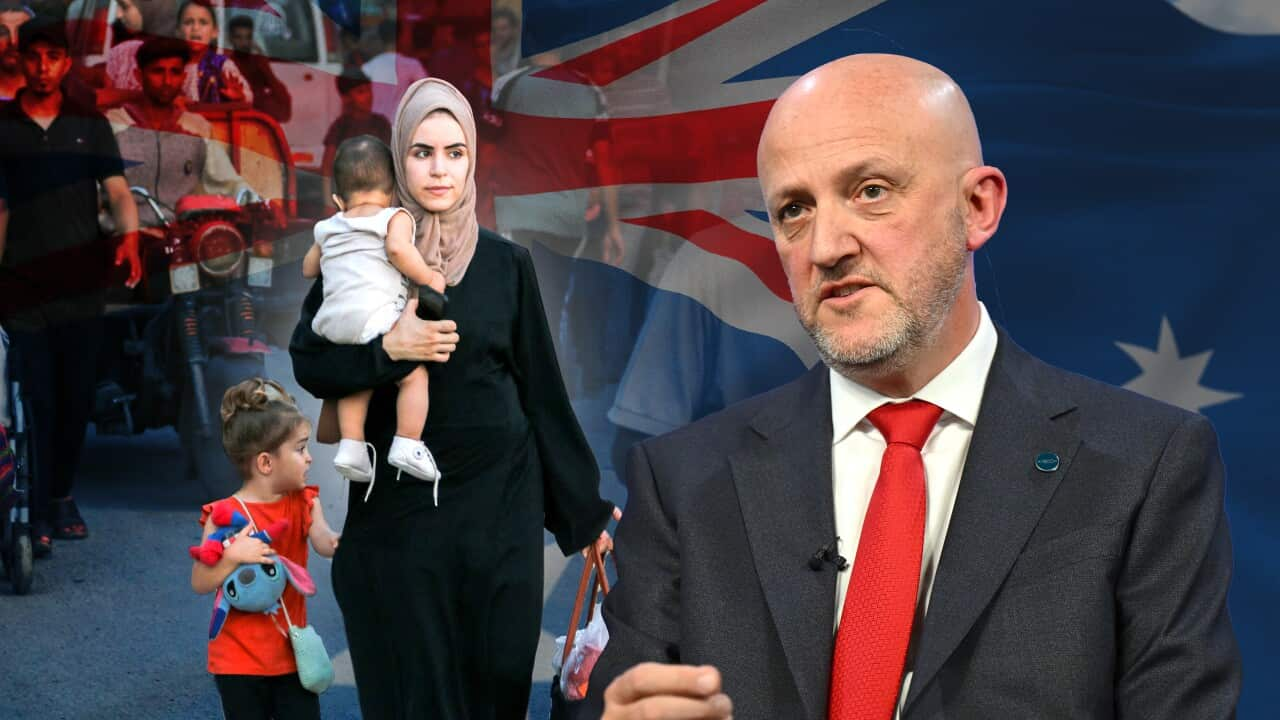Visa security checks for Palestinians seeking to enter Australia from war-torn Gaza have come under scrutiny this week.
Debate erupted after Opposition leader Peter Dutton called for a for people fleeing Gaza — ruled by the Palestinian political and military group Hamas — claiming all applicants from the enclave posed a "national security risk".
Hamas was in which about 1,200 Israelis were killed and 250 taken hostage.
More than 40,000 Palestinians have been killed in Israel's counteroffensive in Gaza, according to health authorities in the enclave.

As of 12 August, the government had rejected 7,111 visa applications from Palestinians and granted 2,922, as of 12 August. In the same period, 8,746 visas were granted to Israeli citizens while 235 visa applications were rejected. Source: SBS News
They also followed remarks by Australian Security Intelligence Organisation (ASIO) director-general Mike Burgess, who revealed that support for Hamas did not automatically disqualify someone from being granted an Australian visa.
"We take each case on its merits and the context of the information we have before us," Burgess told the ABC's Insiders program on Sunday, adding that ASIO has processes to deal with anyone referred to the security agency.
"Once we become aware of them, we're able to do the assessments and deal with them effectively," he said.
Dutton has since expressed his concern that the security agency is not "conducting checks and searches" on everyone fleeing Gaza.
An expert and former high-ranking immigration official told SBS News that this kind of criticism of ASIO is "unprecedented" from a major party leader and clarified how visa application security checks work.
Australia's visa security check process
Abul Rizvi — a former deputy secretary at the Department of Immigration from the early 1990s to 2007 — said visa application checks involve three steps; looking into a person's identity, their connections, and whether they're on a 'movement alert' list.
"So, a person who applies for a visitor visa, a Palestinian who has managed to escape Gaza, would firstly be checked from an identity perspective," he told SBS News.
In this step, authorities check whether a person is "who they say they are, checking things like passports, checking photos, signatures — those sorts of checks".
Applicants are then checked against a movement alert list, which ASIO updates every 24 hours, according to Immigration and Home Affairs Minister Tony Burke.
"I suspect just about every Hamas leader down to a fairly low level is probably on the movement alert list," Rizvi said.
Anyone on such a list would be quickly rejected, Rizvi said.
At this point, or if Home Affairs had flagged a concern, ASIO would be brought in to investigate further, Rizvi said, adding that it was highly unusual for the security agency to check all visitor visa applications.
If an applicant has been flagged with ASIO, the agency then looks at their "social media, relationships, who they've been talking to and who they're connected to in Australia", on a case-by-case basis and depending on the degree of concern, Rizvi said.
A Home Affairs spokesperson told SBS News that the department "screens all applications, including those from people in Israel and the Occupied Palestinian Territories, to determine if they meet security and character criteria".
Are Palestinian visa applicants facing less scrutiny?
On Thursday morning, Dutton contrasted current checks and balances against those the Coalition government had in place for , when he was Home Affairs minister.
"We did face-to-face interviews, we took biometrics tests, and we checked that with our American partners," he told the Nine Network on Thursday.
"The government has done none of that."
Dutton said these refugees were processed in an external country.
Palestinians because Israel controls all sea and air access to Gaza and most of its land borders.
Rizvi agreed that checks for humanitarian visas — for which the Syrian refugees Dutton was referring to applied — were generally more extensive.
However, he noted these closely resembled the checks out of Gaza, despite applicants from Gaza seeking a different class of visa.

Abul Rizvi thinks the significance of certain security measures has been "overblown". Source: SBS News / Ewa Staszewska
"We don't need to do that because the people have got out of Gaza, they would have travel documents, they've applied for a visitor visa.
"The government would have time to do the checks that are necessary," Rizvi said.
What about biometric tests and one-on-one interviews?
Burgess said checking biometrics — often fingerprints or a facial image — was only effective if the government already had these on hand in a database.
Meanwhile, Rivzvi said the value of one-on-one interviews had been "overblown".
"If we were relying largely on face-to-face interviews for security checking, I think that would be a quite flawed process," he said.
"You are better off checking what's happening in the person's background, independent of them talking to people, checking their social media ... That would be a far more effective process than face-to-face interviews."
Criticism of ASIO 'unprecedented'
The backlash to Dutton's concerns was swift, with the Opposition leader's remarks by Labor frontbenchers and independent MPs.
Rizvi said both Dutton's call for a blanket ban and questions over the efficacy of Australia's security agency was "unprecedented".
"I've seen no evidence that the government has attempted to interfere in the decision-making on processes run by our security agencies," he said.
"The idea that a minister would lean on a security agency to somehow run a process different to what the security agency thought appropriate, is a staggering claim.
"I think I'd ask for the evidence for that."










